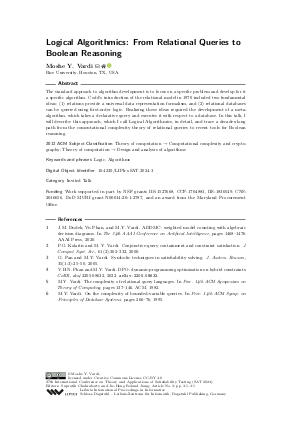Logical Algorithmics: From Relational Queries to Boolean Reasoning (Invited Talk)
Author
Moshe Y. Vardi 
-
Part of:
Volume:
27th International Conference on Theory and Applications of Satisfiability Testing (SAT 2024)
Part of: Series: Leibniz International Proceedings in Informatics (LIPIcs)
Part of: Conference: International Conference on Theory and Applications of Satisfiability Testing (SAT) - License:
 Creative Commons Attribution 4.0 International license
Creative Commons Attribution 4.0 International license
- Publication Date: 2024-08-19
File

PDF
LIPIcs.SAT.2024.3.pdf
- Filesize: 375 kB
- 1 pages
Document Identifiers
Subject Classification
ACM Subject Classification
- Theory of computation → Computational complexity and cryptography
- Theory of computation → Design and analysis of algorithms
Keywords
- Logic
- Algorithms
Metrics
- Access Statistics
-
Total Accesses (updated on a weekly basis)
0PDF Downloads0Metadata Views
Abstract
The standard approach to algorithm development is to focus on a specific problem and develop for it a specific algorithm. Codd’s introduction of the relational model in 1970 included two fundamental ideas: (1) relations provide a universal data representation formalism, and (2) relational databases can be queried using first-order logic. Realizing these ideas required the development of a meta-algorithm, which takes a declarative query and executes it with respect to a database. In this talk, I will describe this approach, which I call Logical Algorithmics, in detail, and trace a decades-long path from the comoutational complexity theory of relational queries to recent tools for Boolean reasoning.
Cite As Get BibTex
Moshe Y. Vardi. Logical Algorithmics: From Relational Queries to Boolean Reasoning (Invited Talk). In 27th International Conference on Theory and Applications of Satisfiability Testing (SAT 2024). Leibniz International Proceedings in Informatics (LIPIcs), Volume 305, p. 3:1, Schloss Dagstuhl – Leibniz-Zentrum für Informatik (2024)
https://doi.org/10.4230/LIPIcs.SAT.2024.3
BibTex
@InProceedings{vardi:LIPIcs.SAT.2024.3,
author = {Vardi, Moshe Y.},
title = {{Logical Algorithmics: From Relational Queries to Boolean Reasoning}},
booktitle = {27th International Conference on Theory and Applications of Satisfiability Testing (SAT 2024)},
pages = {3:1--3:1},
series = {Leibniz International Proceedings in Informatics (LIPIcs)},
ISBN = {978-3-95977-334-8},
ISSN = {1868-8969},
year = {2024},
volume = {305},
editor = {Chakraborty, Supratik and Jiang, Jie-Hong Roland},
publisher = {Schloss Dagstuhl -- Leibniz-Zentrum f{\"u}r Informatik},
address = {Dagstuhl, Germany},
URL = {https://drops.dagstuhl.de/entities/document/10.4230/LIPIcs.SAT.2024.3},
URN = {urn:nbn:de:0030-drops-205253},
doi = {10.4230/LIPIcs.SAT.2024.3},
annote = {Keywords: Logic, Algorithms}
}
Author Details
Funding
Work supported in part by NSF grants IIS-1527668, CCF-1704883, IIS-1830549, CNS-2016656, DoD MURI grant N00014-20-1-2787, and an award from the Maryland Procurement Office.
References
-
J.M. Dudek, Vu Phan, and M.Y. Vardi. ADDMC: weighted model counting with algebraic decision diagrams. In The 34th AAAI Conference on Artificial Intelligence, pages 1468-1476. AAAI Press, 2020.

-
P.G. Kolaitis and M. Y. Vardi. Conjunctive-query containment and constraint satisfaction. J. Comput. Syst. Sci., 61(2):302-332, 2000.

-
G. Pan and M.Y. Vardi. Symbolic techniques in satisfiability solving. J. Autom. Reason., 35(1-3):25-50, 2005.

- V.H.N. Phan and M.Y. Vardi. DPO: dynamic-programming optimization on hybrid constraints. CoRR, abs/2205.08632, 2022. URL: https://arxiv.org/abs/2205.08632.
-
M.Y. Vardi. The complexity of relational query languages. In Proc. 14th ACM Symposium on Theory of Computing, pages 137-146. ACM, 1982.

-
M.Y. Vardi. On the complexity of bounded-variable queries. In Proc. 14th ACM Symp. on Principles of Database Systems, pages 266-76, 1995.

